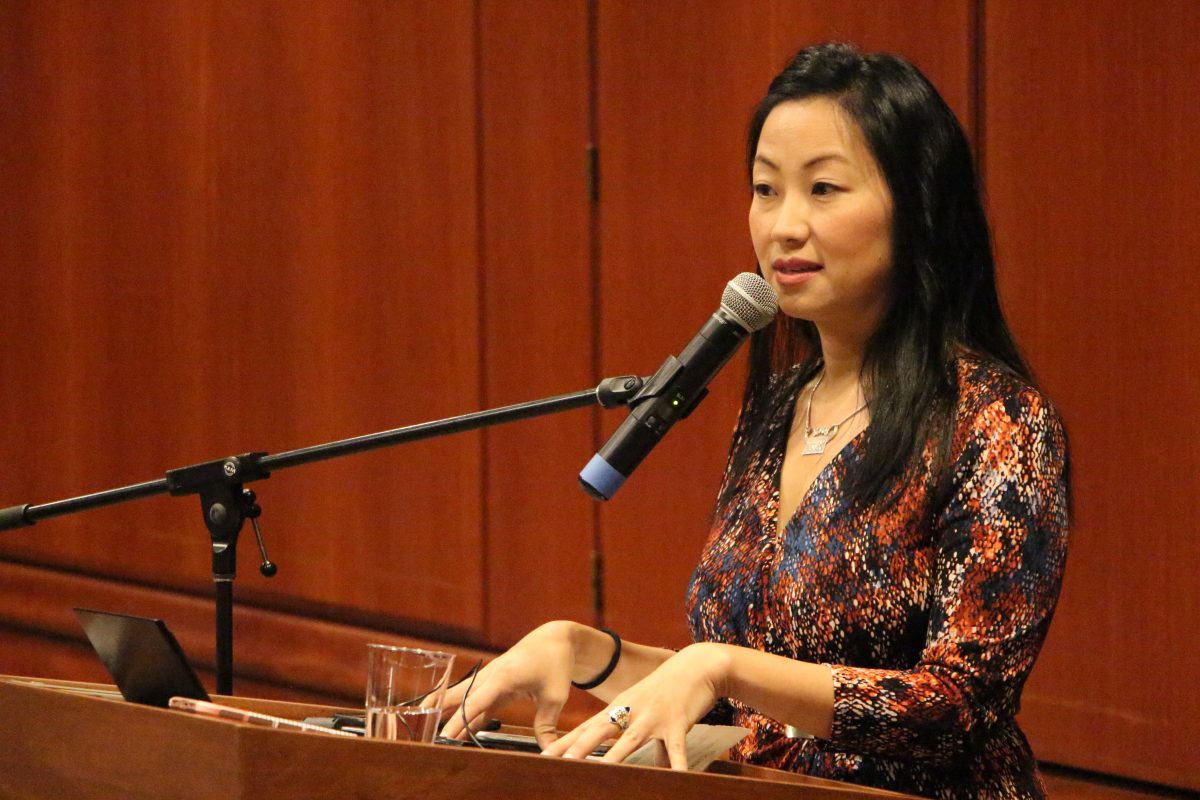MPR journalist shares the devastation that vulnerable communities face and the opportunity that reporters have to illuminate overlooked stories.
By Jasmine Johnson
Cameras clicked and voices hushed as a Minnesota Public Radio correspondent shared her story of growing up as an outcast and her pursuit of journalism as as tool to shed light on the social justice issues of race and immigration.
“My full name is Doualy Xaykaothao, which in my language means the shadow of the moon that shines,” Xaykaothao said to a packed audience of students, faculty and staff in the Eastlund Room at 4 p.m. on November 2.
Born in Laos and raised in Texas, Xaykaothao chose to pursue journalism to dispel societal labels and stereotypes. She understands what it means to be an outcast and desires to invest in the stories of individuals who feel likewise.
“Every opportunity that we have to humanize each other and stop otherizing each other is a win,” Xaykaothao said.
Adjusting to a Texan high school in the 1980s was rather challenging for a Hmong student like her. Glued to her at all times was an identification card, alerting others of her alien status. She often asked herself: “Why am I being treated differently? Am I doing something wrong?”
Growing up in poverty, Xaykaothao holds a unique understanding of those in vulnerable communities that are often left in the dark. “We were literally counting pennies at the grocery store,” she said.
Xaykaothao challenged journalists to uncover the stories of marginalized minorities by shedding the stereotype of being demanding and emotionless invaders. “We are all human beings,” she said, “We all deserve dignity; we all deserve compassion.”
When a Colombian woman was killed accidentally during a police chase in Burnsville, Xaykaothao arrived at the woman’s house shortly after the tragic event. Many other reporters came to the door and asked the three children to talk to them, but Xaykaothao was the only journalist allowed inside; she connected with them by showing compassion.
“They opened the door and we had pizza while they were grieving over the fact that their mother just got killed in a car accident literally hours ago,” she said.
English professor Susan Brooks said that she had gained new appreciation for journalists and their dedication. She encouraged student journalists to remember the “importance of seeing people as human beings.” When looking beyond the surface level of a story, Xaykaothao urged journalists to concentrate on graciously listening to those involved.
While visiting an immigration office at Fort Snelling, Xaykaothao covered a story regarding a Malaysian doctor who was about to be deported. A group of Minnesotan patients were there to support and pray for their doctor. One of the women Xaykaothao interviewed wholeheartedly believed that if Trump would have known about this particular case, he would not deport her.
“You don’t often hear someone say that and this was a chance to humanize a Trump supporter,” she said, “This was a chance to say here’s a human being who believes and stands for Trump and this is what she thinks.” Xaykaothao strives to illuminate many unique opinions by investing in each individual she encounters.
“Journalists should be doing what Doualy is doing because she is the one shining the light on those people,” said Elizabeth Schwarz, a freshman graphic design student. “A lot of those stories are not as prominent; you have to go find them for yourself.”
Xaykaothao discussed the difficulty of uncovering the stories of vulnerable communities, as they are oftentimes pushed aside into a shadowed corner. She insisted that journalists should be the moon, enlightening every nook and cranny to reveal the powerful history of marginalized people.
Xaykaothao studied radio and television in Ithaca College from upstate New York. She started working for National Public Radio as a production assistant in 1999 and later as a producer, editor and director in the newsroom. She also covered international news for NPR in Asia. She received the Peabody Award in 2001 and the LA Press Club Award in 2007 for her reporting.


















